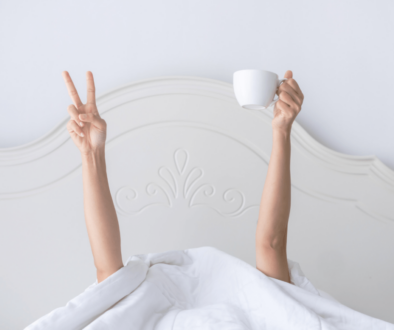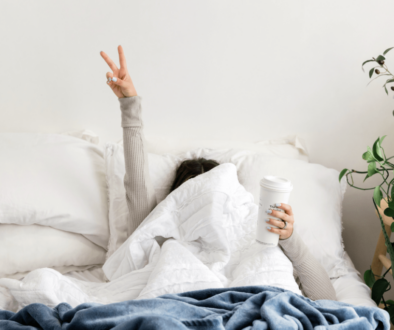Your Sleep Sanctuary: Simple Changes for Better Rest
Your sleep environment plays a pivotal role in determining the quality of your rest. You can create an optimal sleep sanctuary that promotes deep, restorative sleep by harmonising light, temperature, and time.
The Power of Darkness: Creating a Pitch-Black Sleep Haven
Darkness is the key to unlocking your body’s natural sleep mechanism. When exposed to darkness, your brain produces melatonin, which induces sleep. Even minimal light can disrupt this process, leading to fragmented sleep and difficulty waking up refreshed.
- Blackout Curtains are essential for blocking all external light sources, ensuring a pitch-black sleep environment.
- Tech-Free Bedroom: The blue light emitted from electronic devices can suppress melatonin production. Establish a tech-free zone in your bedroom at least an hour before bedtime.
- Sleep Masks: A comfortable sleep mask can block out any residual light, especially for those who live in areas with light pollution or have sensitive eyes.
Temperature: Your Body’s Thermostat
Your body temperature naturally drops as you fall asleep. A slightly cool environment can signal your body to wind down and prepare for rest.
- Optimal Sleep Temperature: 60-67°F (15.5-19.4°C) is ideal for most people.
- Breathable Bedding: Opt for breathable materials like cotton or linen to regulate body temperature.
- Layer Your Bedding: Use lightweight blankets that you can easily adjust to your comfort level.
- Fan or Air Conditioner: A fan or air conditioner can help maintain a comfortable temperature for warmer climates.
- Warm Feet, Cool Head: Keeping your feet warm can promote relaxation and sleep. If needed, wear socks or a heating pad.

Circadian Rhythm: Your Body’s Internal Clock
Your circadian rhythm is a 24-hour internal clock that regulates your sleep-wake cycle. It’s influenced by external cues like light and darkness and internal biological processes. Aligning with your body’s natural rhythm can significantly improve sleep quality.
Key Strategies to Harmonize with Your Circadian Rhythm:
- Morning Light Exposure:
- Sunlight’s Role: Exposure to natural sunlight in the morning helps to suppress melatonin production, signalling to your body that it’s time to wake up.
- Practical Tips: Spend 10-20 minutes outdoors in the morning sunlight, or use a light therapy box if natural light is limited.
- Consistent Sleep Schedule:
- The Power of Routine: Sticking to a consistent sleep schedule, even on weekends, helps regulate your body’s internal clock.
- Benefits of Consistency: Consistent sleep patterns can improve sleep quality, reduce sleep inertia, and enhance overall well-being.
- Dim Evening Lighting:
- Blue Light’s Impact: Blue light emitted from electronic devices can suppress melatonin production, making it harder to fall asleep.
- Creating a Relaxing Environment: Reduce exposure to bright light, especially blue light, in the evening. Use warm-toned lighting or blue-light-blocking glasses to create a calming atmosphere.
These strategies can optimise your circadian rhythm and enjoy more restful and rejuvenating sleep.
Personalised Sleep Environments: Tailoring Your Sleep Sanctuary
- Individual Differences: Consider age, gender, and health conditions when customising your sleep environment.
- Customising Your Space:
- Weighted Blankets: Reduce anxiety and promote relaxation.
- Cooling Pillows: Regulate body temperature for hot sleepers.
- White Noise Machines: Mask disruptive noises.
- Air Purifiers: Improve air quality.
The Science Behind Sleep: Understanding the Neurological Processes
Neurological Processes: A Symphony of Hormones
Sleep is a complex biological process orchestrated by a delicate interplay of neurotransmitters and hormones. Key players in this nightly symphony include:
- Melatonin: Often referred to as the “sleep hormone,” melatonin is produced by the pineal gland in response to darkness. It helps regulate the body’s internal clock, promoting sleepiness and regulating sleep-wake cycles.
- Serotonin: This neurotransmitter plays a crucial role in mood regulation and sleep. It helps to induce feelings of calmness and relaxation, making it easier to fall asleep.
- Adenosine: As we stay awake throughout the day, adenosine builds up in the brain. Elevated levels of adenosine promote sleepiness and inhibit arousal.
Benefits of Quality Sleep: Fueling Your Body and Mind
Adequate sleep is essential for optimal physical and mental health. A good night’s rest provides numerous benefits, including:
- Enhanced Cognitive Function: Sleep is vital for cognitive processes such as memory consolidation, learning, and problem-solving.
- Improved Emotional Well-being: Sufficient sleep helps regulate mood, reduce stress, and enhance emotional resilience.
- Boosted Immune System: A well-rested body is better equipped to fight infections and illnesses.
- Increased Energy Levels: Quality sleep helps restore energy levels and improve overall vitality.
- Enhanced Physical Performance: Sleep is crucial for muscle repair and growth, making it essential for athletes and fitness enthusiasts.
- Reduced Risk of Chronic Diseases: Adequate sleep has been linked to a reduced risk of chronic conditions such as heart disease, diabetes, and obesity.
By understanding the intricate mechanisms behind sleep and its numerous benefits, we can prioritise quality sleep as a fundamental aspect of our overall well-being.
Practical Tips and Troubleshooting: Creating a Relaxing Bedtime Routine
- Create a Relaxing Bedtime Routine:
- Take a warm bath.
- Read a book.
- Practice mindfulness or meditation.
- Addressing Common Sleep Issues:
- Insomnia
- Sleep apnea
- Restless leg syndrome
- Sleep Hygiene Best Practices:
- Avoid caffeine and alcohol before bed.
- Limit daytime naps.
- Create a consistent sleep schedule.

Additional Tips for Optimal Sleep:
- Aromatherapy: Use essential oils like lavender and chamomile to promote relaxation and sleep.
- Nutrition: Maintain a balanced diet and avoid heavy meals before bed.
- Exercise: Regular physical activity can improve sleep quality, but time workouts wisely.
By implementing these strategies, you can transform your sleep environment into a haven of tranquillity and wake up refreshed and rejuvenated. Remember, a good night’s sleep is an investment in your overall health and well-being.




